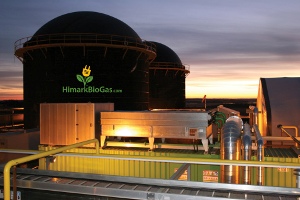Jul 24 2014
Himark BioGas International (Himark BioGas) has signed an agreement with NEO Energy LLC for the design, construction, and start-up of three (3) integrated anaerobic digestion (AD) and fertilizer plants in Massachusetts and Rhode Island. The AD plants will recycle food waste to produce organic-based fertilizer and renewable electricity.
 This plant was designed by Himark BioGas and was GE Jenbacher's first customer in North America. (Photo: Business Wire)
This plant was designed by Himark BioGas and was GE Jenbacher's first customer in North America. (Photo: Business Wire)
As part of the agreement, Himark BioGas will act as a technology licensor and owner’s representative on behalf of NEO Energy LLC during the design, construction and operation stages of the plants.
AD plants designed on Himark BioGas’ patented “IMUS” technology can produce renewable energy and pathogen-free fertilizer from food waste (which is what NEO is focused on), source separated organic materials, cow manure, ethanol plant waste/thin stillage, slaughter house waste, food processing waste, and agricultural waste (open pen feedlot, sand-laden dairies, etc.). The IMUS technology also can handle feedstock containing large amounts of sand, dirt, rocks, plastic, and cellulose. Furthermore, with its turnkey, guaranteed-maximum capital cost designs, Himark BioGas guarantees electricity, gas and fertilizer outputs with any kind of feedstock. Himark’s AD plants are developed and integrated with the client’s processes at a rapid pace and the best short- and long-range profitability.
The entire catalogue of technologies enjoys protection by patents in the U.S. and various other countries.
Shane Chrapko, CEO of Himark BioGas commented, “The development of the anaerobic digestion plants will positively contribute to effective food waste recycling, profitable pathogen-free fertilizer production, energy self-sufficiency and a reduction in carbon emissions for the local communities. Each ton of food waste diverted from the landfill will reduce Greenhouse Gas Emissions by just over one ton of CO2 (Equivalent).”
Robert Nicholson, President of NEO Energy LLC, says that “NEO’s anaerobic digestion plants will recycle food waste generated by supermarkets, food processors, restaurants and other institutions and divert that waste away from landfills and incineration facilities. Our plants produce a high-quality organic-based fertilizer while reducing greenhouse gases, preserving landfill capacity and producing renewable energy. Our first plants will also be available to those businesses that will need to comply with the 2014 commercial food waste disposal ban in Massachusetts and the recently enacted law in Rhode Island requiring that food residuals produced by large waste generators be recycled starting in 2016.